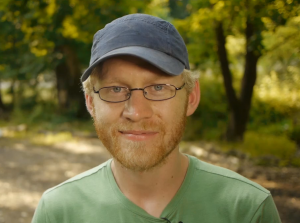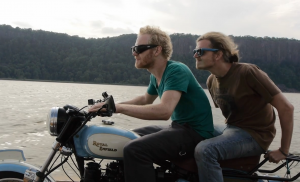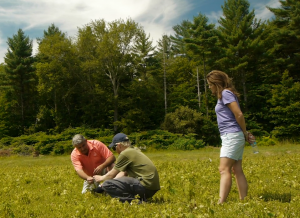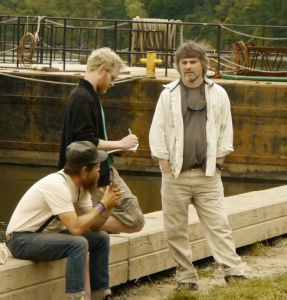
Erik Fyfe studied environmental management at the Yale School of Forestry before embarking on Slow Ride Stories
“Climate change has become such a hot button issue in the United States that people are uncomfortable talking about it,” states Erik Fyfe. ”I imagine that the only time that the average person hears anyone talk about climate change is if it comes up in the news or in political debate. And even then, the ‘conversation’ is reduced to sound bites or comment board bickering.”
This past summer, Fyfe and his longtime friend Albert Thrower set out with a spirit of adventure, a bit of patience, and some film equipment to engage people in honest climate change conversations. The duo spent eight weeks traveling the back roads of the Northeast on a biodiesel-powered motorcycle, stopping in communities along the way to talk to people about climate change, recent weather, and their lives. While on the road, they compiled interview footage from their journey into a series of videos—sometimes funny, often poignant—and uploaded them to their website for public view. They call the project Slow Ride Stories.
“The main point of the project is to humanize the conversation about global climate change,” explains Fyfe. “What we’re trying to do with Slow Ride Stories is to get away from the bickering and simply record what real, everyday people have to say about climate change and share those perspectives in a respectful, accessible, and entertaining format.”
The Slow Ride Stories team began their journey on the Hudson River. From there, Fyfe and Thrower took their bike through New York to the Catskills and the Berkshires, Connecticut and Cape Cod, interviewing the folks they met at every stop. “Last year with the flooding was a big wakeup call for everybody,” commented a distiller in Tuthilltown, NY. “Most of the rules are off. There are no more things you can count on.” A cranberry grower in Massachusetts also noted weather changes, but said, “I think man has an overestimated opinion of himself in thinking we can change what Mother Nature does. I think we go through cycles of weather changes…next year will be something totally different.” Visit the Slow Ride Stories website to hear from these folks and others—from a barber to a sailor, a ski resort owner to an oceanographer.
Below, Fyfe reflects on the trip and elaborates on his goals for Slow Ride Stories, his personal experience with climate change, and the ways we can approach this tricky subject that just might resonate.
Q: What do you hope people come away with after watching your video episodes?
A: I hope that the videos give people an opportunity to hear from someone they wouldn’t have heard from otherwise. How often do you get to hear what a truck driver or a sawmill operator has to say about climate change? SRS is obviously just a small project, so I don’t think we expect large outcomes from it. But I would hope that on some level the videos spark conversation about climate change among people who don’t usually talk about it. My main hope is that projects like SRS might help depoliticize the issue and help people with different perspectives figure out a way to communicate constructively with one another about climate change.
Q: What is your own personal experience with climate change?
A: I’ve studied numerous aspects of it in school: basic climate science, policy implications, technology…As far as personal experience, I’m obviously too young and I’ve probably moved around too much to be able to claim that I’ve personally observed climate change in my life. I do think it’s fascinating how often I hear people who’ve lived in one area for a long time talk about how strange the weather patterns have been in the last 5 years or 10 years, or how much warmer the winters are now than they used to be a few decades ago. I also think it’s fascinating that the words “climate change” and “global warming” evoke such powerful emotional responses and that people who are vocal about their perspectives on the issue are immediately villainized by the individuals, businesses, or organizations that hold a different perspective. It seems like that only makes it all the more difficult for people to talk about the issue.

Fyfe and Thrower traveling on their motorcycle. “We only used 22 gallons of fuel (1/3 of which were biodiesel) to travel 2200 miles on our trip,” says Fyfe.
Q: How is Slow Ride Stories different from other groups working to promote climate change awareness? How does it fit into this larger picture of climate initiatives?
A: I’m not sure this project does much in the category of promoting climate change awareness. It’s more about promoting communication. As one of our Twitter followers put it: “i like that @slowridestories isn’t all about people’s capital buys or renovations. it’s not instructional, it’s a social dipstick reading.”
Something that might make it unique as a media project in general is that we made a pretty conscious effort to avoid putting our own commentary or spin on the interviews. With any media, I think it’s pretty tempting to take quotes out of context or sensationalize what people say to strengthen whatever point you’re trying to make or for added entertainment value. Our approach with the SRS episodes has been more, “This is someone we met on our trip, now you can listen for yourself to what they have to say.”
As far as the big picture is concerned, SRS is a small experiment in how someone might think about designing a national dialogue on climate change. And I don’t mean that it would be done in the same format. But I think that if someone wanted to design a true dialogue on climate change it would mean finding a way to build trust and empathy among people who understand the issue in different ways, and it would mean finding a way to filter out the political noise surrounding the issue.
Q: What are some of the challenges you encountered during your climate change conversations?
A: For the most part our “conversations” were interviews, so we didn’t do much talking aside from asking questions. We noticed in the first couple days of the project that if we told someone that we were interviewing people about perspectives on climate change, they would either tell us that they didn’t know anything about it and decline to be interviewed or they would tell us exactly what they must have thought we wanted to hear: melting ice caps, sea level rise, carbon emissions, etc. We didn’t want either of those things to happen, so I held off on explaining the project until 3/4s of the way into the conversation. In that way, we ended up hearing a person’s perspective on the issue from the context of his or her own experience.
Q: What surprised you most about the perspectives you heard during your interviews?
A: For one, we almost never anticipated what a person was going to say once they started to talk about climate change, and I think that’s part of the value of using the videos to put faces on these different perspectives. And as I mentioned before, it was almost uncanny how often we would ask someone what the weather’s like where they live and they would start talking about how strange it’s been over the last few years.
Q: Tell me about one of the most rewarding conversations or experiences you had!
A: There were so many! It’s just rewarding to meet someone, spend time learning about what they do and where they live, and hear them talk about an issue that they probably don’t get to talk about very often. And we ended up seeing so many things that make the northeast great! One of the funnier moments that comes to mind was one night when we rumbled into a campground in Maine and ended up quickly joining a group of friendly, older women for a rowdy Bingo game.
Q: Having talked to so many different people around the Northeast, how do you think we can continue to link issues like extreme weather, carbon emissions, and climate change in the public mind?
A: I think it’s important to call it like it is, but not to overreach. I think sometimes people can go a little overboard with blaming every strange weather event or bizarre phenomenon on climate change. In some ways this is taking advantage of an opportunity to discuss and draw attention to the issue, but it’s important not to exaggerate the issue or claim that one particular flood or hurricane is definitively the result of climate change. It should be enough to say what we know from scientific data: that the overall trend towards these increasing extreme and erratic weather events is consistent with the projected climatic changes that are linked with increasing greenhouse gas emissions. It’s not as sensational a way to put it, but it’s honest and maintains the credibility of your message, which is essential for maintaining people’s trust.
Q: What advice would you give to others interested in kickstarting their own conversations about climate change?
A: This really depends on the situation and what a person hoped to get out of the conversation. In our case, we didn’t think of the interviews themselves as conversations that have been “kickstarted.” Our intention is that conversations about climate change are sparked after people watch the videos. Our motive during the interviews was just to record what the person had to say, and it helped that we were genuinely interested in listening to them. We also didn’t start with climate change, we took some time to learn about the person’s work and where they’re coming from. When it came to asking about climate change, we found that people were generally more comfortable and familiar with the term “global warming” as opposed to “climate change.” And it helped that we weren’t trying to convince anyone to share our understanding of the issue. I think that generally people are going to gather their information about controversial issues from sources they trust.
For more information and to view the Slow Ride Stories episodes, visit slowridestories.com
All images: Slow Ride Stories









